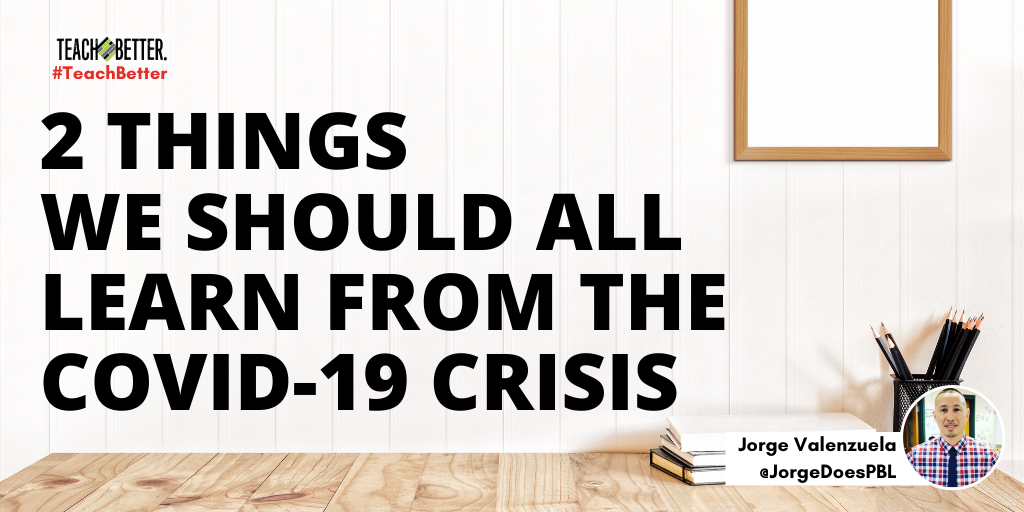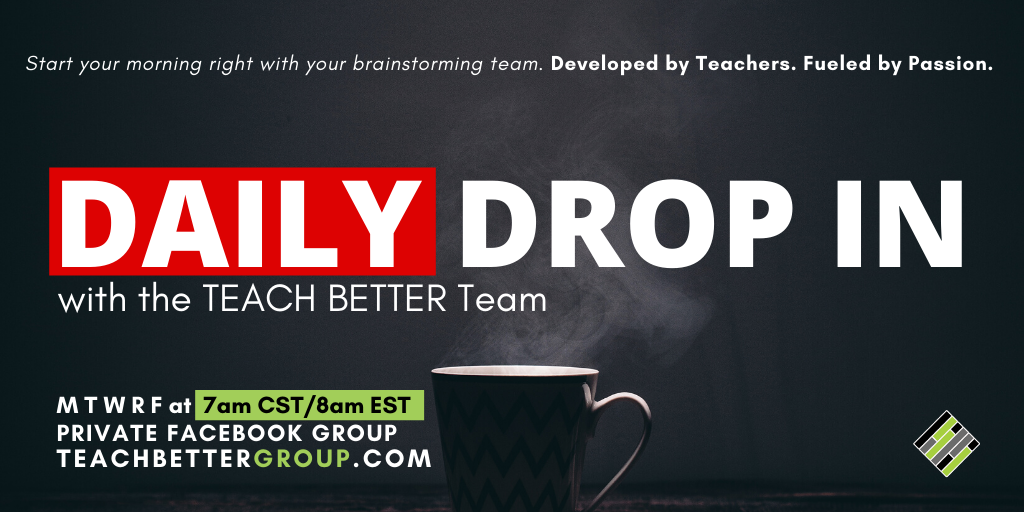TL;DR:
- The COVID-19 crisis has brought many conversations to the forefront, including those of equity and education’s future.
- Two things both educators and non-educators can learn from this crisis.
- Resources to assist your learning and reflection.
We are living in unprecedented times. The effects of the COVID-19 crisis are rapidly reshaping American society. In my lifetime, I can’t think of a larger-scale, more life-altering event, aside from September 11 or the financial crisis of 2008. Years later, as a nation, we are still reeling from those events. We are changed forever because of them.
Moreover, several businesses have also been forced to make tough decisions about their employees. Consequently, while some workplaces have been forced to let staff go, others have been able to place employees on furlough. Essentially, this means that an employee or worker can agree with their employer to be put on furlough to stop work temporarily but stay employed, or ‘flexible furlough’ to work some of their usual hours and be put on furlough for the hours they did not work. Ultimately, this can be a difficult time for both employers and staff. Correspondingly, if you would like further information about furlough, you can take a look at this useful guide that answers common questions such as ‘what is furlough?’ and much more.
Other discussions are swirling too. They range from the immediate social and economic impact to the global economy. From shopping to stock up for essentials to how we work. There are many discussions of our health care system. From E3 to Apple Events to just local trade shows, major conferences have also had to be canceled and in its place, online event production has seriously stepped up. Business calls can now be done from the comfort of your home and many people are working from home.
No doubt, the coronavirus pandemic presents unparalleled ambiguity in regards to equitable access ‘for all‘. Whether that access be to food, essentials, jobs, medical care, racial equity, and the future of how we do school in the United States.
Experts predict that the long-lasting effects of COVID-19 to both the health of survivors and our daily lives will take months, perhaps even longer, to understand and recover from before it’s back to business as usual.
Even with all of this uncertainty, I believe this prolonged time at home can teach us some valuable lessons. Mainly, how we respond both economically and socially in times of unrest (and also in prosperity).
Even with all of this uncertainty, I believe this prolonged time at home can teach us some valuable lessons. Click To TweetWhether we are educators or not, here are two things we can all learn now, along with appropriate responses.
1. Be Less Extravagant in Spending
At some point in our lives, I think we have all been guilty of foolish and wasteful spending with our hard-earned money. But if extravagant spending has been a habit, the uncertainty of not knowing whether our future earnings will be ‘enough‘ may cause us to regret some of the purchases we didn’t really need to make.
The pandemic has caused millions of people to lose their job or has left them earning less than usual so some people don’t have a choice to stop extravagant spending. They’ve found themselves on sites like https://bayern-online.de, looking for the best money-saving tips. Sometimes, you’re allowed to treat yourself to something but you need to know when to stop too.
It is important to understand that for the rich or extremely well off, extravagant spending may not cause them much difficulty. However, daily extravagances for the rest of us will add up and can set back our goals. And at times like this, our previous spending habits may even prevent us from getting much needed necessities.

The coronavirus pandemic has shown us that our own overspending can prevent others from getting essential items. Particularly as so many of our grocery stores struggle to remain stocked.
Studies show that fear is the motivator for people to protect themselves and their families – even at the expense of others. In response, many grocers have placed purchase limits in their stores and are advising shoppers not to hoard goods.
Photo Credit: KRDO News
To help us make better purchases and consider the needs of others moving forward, here are some tips for us to consider:
- Know your monthly expenses and create a plan for saving up for six months of whatever that may be. Don’t forget periodic expenses. If you’re considering moving, understand the cost of living wherever that may be in comparison to where you currently are.
- Learn to successfully live within your means.
- Stockpile within reason.
- Consider hobbies that have little or no cost.
- Help others.
- Keep a gratitude journal.
2. Display Empathy for Others
Being mindful and empathic toward others shouldn’t be confined to just our grocery stores. It’s also in our ability to share in their feelings. We have seen that a crisis often results in collective strengthened patriotism, and I believe that is very important because we are always better together as a nation.
As Congressman Patrick McHenry stated, “In times of crisis, patriotism unites us. We put our differences aside to help our countrymen in need.”
However, there is a difference between patriotism and nationalism. Patriotism is the love of one’s country and fellow countrymen, in tandem with acts that include support of our brave military, voting in elections, observing laws, filing for taxes ethically, and understanding how one’s state legislature works.
On the other hand, nationalism is divisive and unites one group of people against another. Although this has become an unavoidable trend throughout the United States, division should never be intentional. It has no place in the law-abiding citizenship of our country because it hurts the innocent.
In the days prior to mandatory COVID-19 school closings, I walked into a classroom to observe instruction at one of the schools I coach at. A student looked at me and said, “Oh no, Corona Virus is in here.”
Although I did not take offense to the comment, I understand this is most likely due to my facial features and the anti-Asian sentiment that has been documented across various forms of media since the crisis began.
Some of the reports of Chinese and Asian Americans being unjustly harassed include incidents of racism, such as micro aggressions, misplaced blaming for COVID-19, and name-calling. More severe reported incidents involve vandalism of property and physical assault. At any time and any place all of this is wrong, unfortunate, and needs immediate addressing.
For both teachers and non-teachers, I believe the time is ripe to learn and teach about the importance of displaying empathy for others.
Here are some surefire ways to get the empathy ball rolling (especially with extra time during COVID-19):
- Understand about The Three Kinds of Empathy: Emotional, Cognitive, and Compassionate
- How to Show Empathy
- 31 Empathetic Statements and seven responses to avoid
- Edutopia: How to Respond When Students Use Hate Speech
BONUS empathy and equity-driven resources for educators to consider:
- 5 Strategies for Empowering Women in the Classroom
- Becoming the Educator They Need: Strategies, Mindsets, and Beliefs for Supporting Male Black and Latino Students
- How Schools Can Create a Safe Environment for Muslim Students
- 5 Things You Can Do to Support Your LGBTQ Students
Final Thoughts
For those who typically follow my education blogs, this is quite a departure from my usual topics. This came as a result of a request from Matthew Grundler when he interviewed me on the Creativity Department Podcast that he co-hosts with his wife, Laura.
Matthew asked me this as a final thought as we wrapped up the show. I thought it selfish not to impart what I believe to be genuinely needed for both my teaching colleagues and non-teaching friends to consider at this time. I hope readers find these items helpful through the current crisis and beyond.
ABOUT JORGE VALENZUELA
Educational coach Jorge Valenzuela is new to the Teach Better Team, a teacher at Old Dominion University and the lead coach for Life Long Learning Defined. His work is aimed at helping schools understand and implement computational thinking, computer science, STEM, and project-based learning. Currently, Jorge presents nationally on these topics; is an award winner, the author of Rev Up Robotics, an education advocate, and frequent contributor to books, academic journals, how-to blogs, podcasts, and webinars. Jorge is also a member of the Teach Better Speakers Network.




